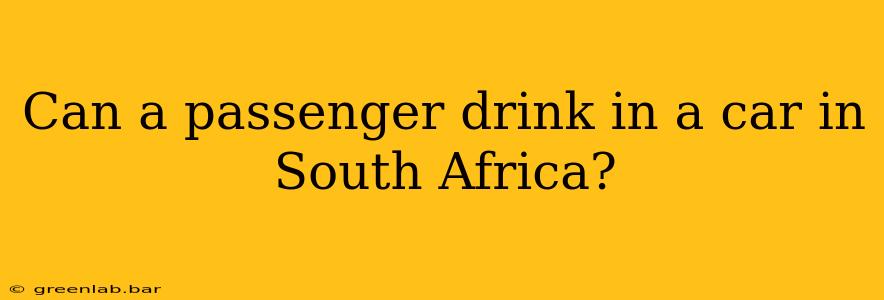South Africa has strict laws regarding alcohol consumption and driving, aiming to curb the alarming number of alcohol-related accidents. While the specifics might seem nuanced, the overarching principle is clear: drinking and driving is illegal and dangerous. This guide clarifies the legal position of passengers drinking alcohol in a moving vehicle in South Africa.
The Legality of Passengers Drinking Alcohol in a Car
The short answer is: it's generally legal for passengers to drink alcohol in a moving vehicle in South Africa, provided the driver is not drinking. However, this doesn't mean it's without potential consequences. The law focuses primarily on preventing drivers from driving under the influence, not passengers. This means there's no specific law directly prohibiting passengers from consuming alcohol.
However, several indirect factors could lead to legal trouble:
1. Public Intoxication:
While passengers drinking isn't explicitly prohibited, if their consumption leads to public intoxication or disorderly behavior, they could face charges. This is especially true if the intoxication results in a disturbance of the peace or a threat to public safety. The police have the authority to intervene if a passenger's behavior is deemed disruptive or poses a risk.
2. Obstruction of Justice:
If a passenger, under the influence, hinders or interferes with police officers conducting a traffic stop or investigation, they could face charges, regardless of whether they were the driver.
3. Contributory Negligence in Accidents:
In the unfortunate event of an accident caused by a drunk driver, a heavily intoxicated passenger could be held partially responsible (contributory negligence) if their actions contributed to the accident, such as distracting the driver. This could affect any civil claims arising from the accident.
4. Vehicle Owner's Responsibility:
The vehicle owner might face legal consequences if they knowingly allowed passengers to drink to excess in their car, especially if this contributes to an accident caused by a driver who has been consuming alcohol.
Key Considerations and Recommendations
- Driver Responsibility: The driver remains solely responsible for ensuring they are fit to drive. Even if passengers are drinking, the driver must remain sober and comply with all traffic laws.
- Responsible Consumption: Even if legal, excessive alcohol consumption in a vehicle is discouraged. It's far safer to consume alcohol in a controlled environment away from the road.
- Zero Tolerance: Remember, South Africa’s approach to drinking and driving is one of zero tolerance. Even a small amount of alcohol can impair judgment and reaction time.
- Police Discretion: While there's no specific law against passengers drinking, police officers have broad powers to intervene if they deem a situation unsafe or disruptive.
Conclusion: Prioritize Safety
While passengers can legally drink alcohol in a moving vehicle in South Africa, the focus should always be on safety. Excessive drinking, disorderly conduct, and any actions that could contribute to unsafe driving conditions are strongly discouraged. The best practice is to leave alcohol consumption for controlled and safe environments, away from the roads. Remember that the potential consequences, even if indirect, can be significant.

